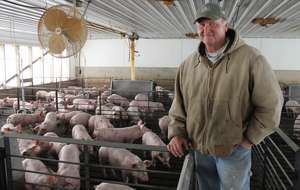Is it better to say “no” to starving people?
“Is help from corporate agriculture beneficial?” was a headline that grabbed my attention in the July 5th issue of The Des Moines Register. Columnist Rekha Basu goes on to write:
“An Iowan launched the so-called Green Revolution, and the World Food Prize that he created annually honors others who have made important innovations in agriculture. Iowa today is in the vanguard of the biotech revolution. So it may be hard to contemplate the paradox that even as we have helped block world hunger, we might also inadvertently be contributing to it.”
The “so-called Green Revolution” seems like particularly patronizing and disrespectful statement about someone who literally altered history. Dr. Norman Borlaug’s breeding of high-yielding cereal crops helped avert mass famines that were widely predicted in the 1960s. “Countries that had been food deficient, like Mexico and India, became self-sufficient in producing cereal grain,” according to a New York Times article. It’s no wonder that in 1970 the Nobel Peace Prize was awarded to Dr. Borlaug for saving hundreds of millions of lives.
Thanks to biotechnology, crop yields have increased six times since 1940! Corn yields were flat between 1866 and 1939 at about 26 bushels per acre. Due to the development of hybrid seeds in the 1940s, yields increased dramatically in the 1940s. The widespread use (not overuse) of nitrogen fertilizers and herbicides is credit for increasing yields even more. By 2009, average corn yields reached an average of 165 bushels per acre. In 2011, Iowa corn growers harvested an average of 172 bushels per acre.
Not only have U.S. farmers learned how to produce more grain, but they’ve learned to do so more efficiently. Farmers today grow five times as much corn as they did in the 1930s on 20% less land, according to the Corn Farmers Coalition. Commercial fertilizer is another reason North American farmers produce the most abundant, nutritious food supply worldwide. It’s also one of the main reasons why Americans spend less of their income on food than any other nation. In fact, farmers today produce one-third more corn for each pound of nitrogen they apply as compared to 20 years ago. Just think of the amount of land we’d have to put into agriculture production – land is currently now serving as parks and wildlife habitats – just to be able to produce enough food to feed the world’s growing population.
So given all the good that has come from it, tell me again why biotechnology is getting a bad rap. Biotechnology has been around since the 1850s when Gregor Mendel began crossing tall and short garden peas to create hybrid plants that resembled the tall parent rather than creating a medium height blend. His observations led to two terms that are still used in present-day genetics: dominant and recessive.
The hybridization of plants, as well as improved production methods, are just a few of the ways farmers around the world benefit from “technology transfer.” Let’s take a look how Iowans, just in the year 2012, have made a positive impact on farmers from other countries:
- Iowa/Uganda Farmer-to-Farmer Exchange – objectives were to improve post-harvest grain quality for Ugandan farm women and improve their record keeping skills
- Meals from the Heartland – Iowa FFA students, in just 2 days, assembled 250,000 meals that were sent to feed starving Haitians
- Homes for Haiti – Thanks to efforts initiated by Iowa-based Global Compassion Network, 48 Safe T Homes® are being erected on the Village of Hope near Port au Prince, Haiti. Each dwelling, manufactured by Sukup, can provide shelter for 10 people.
If we care about people around the world at all, then Americans must share their knowledge so others can benefit. I believe that it’s our moral obligation to help share information and technology with fellow farmers – whether they’re from Uganda, Haiti, Mexico or even the U.S. – that can help them produce more food with fewer resources. I just can’t see how it can be more compassionate to let people starve than it is to provide them with jobs or to help teach them how to provide jobs for themselves (i.e. to become self-sufficient farmers).
